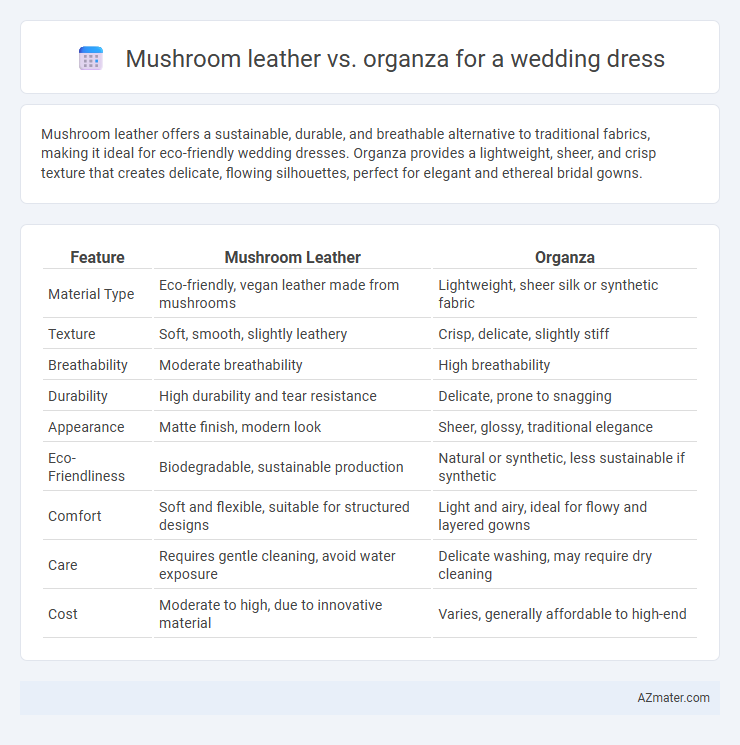Mushroom leather offers a sustainable, durable, and breathable alternative to traditional fabrics, making it ideal for eco-friendly wedding dresses. Organza provides a lightweight, sheer, and crisp texture that creates delicate, flowing silhouettes, perfect for elegant and ethereal bridal gowns.
Table of Comparison
| Feature | Mushroom Leather | Organza |
|---|---|---|
| Material Type | Eco-friendly, vegan leather made from mushrooms | Lightweight, sheer silk or synthetic fabric |
| Texture | Soft, smooth, slightly leathery | Crisp, delicate, slightly stiff |
| Breathability | Moderate breathability | High breathability |
| Durability | High durability and tear resistance | Delicate, prone to snagging |
| Appearance | Matte finish, modern look | Sheer, glossy, traditional elegance |
| Eco-Friendliness | Biodegradable, sustainable production | Natural or synthetic, less sustainable if synthetic |
| Comfort | Soft and flexible, suitable for structured designs | Light and airy, ideal for flowy and layered gowns |
| Care | Requires gentle cleaning, avoid water exposure | Delicate washing, may require dry cleaning |
| Cost | Moderate to high, due to innovative material | Varies, generally affordable to high-end |
Introduction: The Evolution of Wedding Dress Fabrics
Mushroom leather represents an innovative, sustainable alternative to traditional fabrics, offering durability and a unique texture that appeals to eco-conscious brides. Organza, a classic choice, is prized for its lightweight, sheer quality and delicate shimmer that creates ethereal silhouettes. The evolution of wedding dress fabrics showcases a shift towards combining modern sustainability with timeless elegance, reflecting changing values and advancements in textile technology.
What is Mushroom Leather?
Mushroom leather is an innovative, sustainable material derived from mycelium, the root structure of mushrooms, offering an eco-friendly alternative to traditional leather. It boasts a soft, flexible texture ideal for contemporary wedding dress designs seeking cruelty-free options. Organza, in contrast, is a sheer, lightweight fabric made from silk or synthetic fibers, prized for its delicate, translucent appearance and structured drape in classic bridal gowns.
Understanding Organza: Traditional Elegance
Organza, a sheer and lightweight fabric made from silk or synthetic fibers, is prized in wedding dress design for its traditional elegance and crisp texture. Its translucent quality adds delicate volume and structure, creating a graceful silhouette favored in classic bridal gowns. Unlike mushroom leather, which offers an eco-friendly and textured alternative, organza maintains a timeless, ethereal appearance essential for romantic and sophisticated wedding attire.
Sustainability Comparison: Eco-Friendliness of Each Fabric
Mushroom leather, derived from mycelium, offers a biodegradable and renewable alternative to traditional leather, significantly reducing environmental impact through low water usage and minimal chemical processing. Organza, typically made from silk or synthetic fibers like polyester, has varied sustainability profiles; silk organza is biodegradable but involves resource-intensive sericulture, while polyester organza relies on fossil fuels and is less eco-friendly due to its non-biodegradable nature. Choosing mushroom leather over synthetic organza enhances sustainability in wedding dresses by minimizing carbon footprint, promoting circular fashion, and supporting innovative natural materials.
Texture and Aesthetic Differences
Mushroom leather offers a smooth, matte texture with a subtle organic feel, creating a modern, eco-friendly aesthetic ideal for structured designs. Organza features a lightweight, sheer texture with a crisp finish, providing a delicate, ethereal look that enhances flow and volume in wedding dresses. The tactile contrast between the sturdy, minimalist mushroom leather and the airy, translucent organza defines their distinct visual and sensory appeal in bridal fashion.
Durability and Comfort for Brides
Mushroom leather offers exceptional durability with its resistance to wear and tear, making it ideal for a wedding dress that needs to withstand hours of celebration. In contrast, organza provides lightweight comfort and breathability, ensuring brides stay cool and flexible throughout the day but with less structural strength. Choosing between mushroom leather and organza depends on prioritizing long-lasting support or soft, airy comfort for the wedding attire.
Customization and Design Flexibility
Mushroom leather offers exceptional customization options through its ability to be dyed in various rich tones and molded into structured shapes, making it ideal for avant-garde wedding dress designs. Organza provides high design flexibility with its sheer, lightweight texture, allowing intricate layering, pleating, and embroidery for delicate, ethereal gowns. Both materials support unique customization but serve distinct aesthetic preferences: mushroom leather for modern, sculptural looks, and organza for romantic, flowing silhouettes.
Care and Maintenance Needs
Mushroom leather requires gentle cleaning with a damp cloth and occasional conditioning to maintain its flexibility and prevent cracking, avoiding harsh chemicals that can damage its natural fibers. Organza demands delicate hand washing or dry cleaning, as its sheer, lightweight fabric is prone to snags and distortion from improper handling. Both materials need careful storage away from direct sunlight and moisture to preserve their texture and color for wedding dress longevity.
Cost Analysis: Affordability of Mushroom Leather vs Organza
Mushroom leather offers a sustainable yet cost-effective alternative to traditional materials, priced moderately higher than organza due to its innovative production process and eco-friendly properties. Organza remains more affordable and widely accessible, favored for its lightness and sheer elegance in wedding dresses. Budget-conscious brides may opt for organza to lower costs, while those prioritizing sustainability might justify mushroom leather's premium price.
Choosing the Right Fabric: Factors to Consider
Mushroom leather offers a sustainable and durable option characterized by its unique texture and eco-friendly properties, making it ideal for modern, avant-garde wedding dresses. Organza provides a lightweight, sheer, and crisp fabric that enhances volume and elegance, perfect for traditional or ethereal bridal designs. When choosing the right fabric, factors such as breathability, comfort, appearance, and the desired wedding theme must be carefully evaluated to ensure the dress balances style with practicality.

Infographic: Mushroom leather vs Organza for Wedding dress
 azmater.com
azmater.com